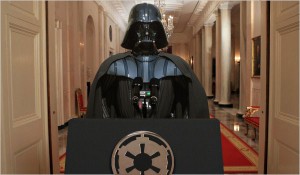Dale McGowan explains (in an otherwise worthwhile piece that I’m not going to focus on here) how he helped his 9-year-old daughter deal with the fear that resulted from her having heard about Christian radio-show host Harold Camping’s (latest) prediction that the world would end soon:
I looked her in the eye. “When you’re trying to figure out what to believe, a good way to start is to just ask why other people believe it, then decide whether it’s a good reason.”
We can apply this approach to the question of whether human activity is altering the climate, and whether that alteration is dangerous. For example, today USA Today ran an editorial (Our view: America, pick your climate choices) that basically equates climate change deniers with birthers:
Late last week, the nation’s pre-eminent scientific advisory group, the National Research Council arm of the National Academy of Sciences, issued a report called “America’s Climate Choices.” As scientific reports go, its key findings were straightforward and unequivocal: “Climate change is occurring, is very likely caused primarily by human activities, and poses significant risks to humans and the environment.” Among those risks in the USA: more intense and frequent heat waves, threats to coastal communities from rising sea levels, and greater drying of the arid Southwest.
Coincidentally, USA TODAY’s Dan Vergano reported Monday, a statistics journal retracted a federally funded study that had become a touchstone among climate-change deniers. The retraction followed complaints of plagiarism and use of unreliable sources, such as Wikipedia.
Taken together, these developments ought to leave the deniers in the same position as the “birthers,” who continue to challenge President Obama’s American citizenship – a vocal minority that refuses to accept overwhelming evidence.
Nothing much new here (as the editorial points out). But they also did something interesting: They ran an “opposing view” piece by Sen. Jim Inhofe (R-OK) arguing the opposite position. See Inhofe’s view: All pain, no gain.
Not too long ago, President Obama and his Democratic allies in Congress proudly announced that America would lead the fight against global warming by passing a cap-and-trade bill. But despite overwhelming majorities in both houses of Congress in 2009, Democrats barely found the votes to get the proposal through the House, and Senate Democrats never even brought it up for a vote.
The reason is simple. Cap-and-trade is designed to make the energy we use more expensive. Consider President Obama’s Energy Secretary Steven Chu, who said in 2008, “Somehow, we have to figure out how to boost the price of gasoline to the levels in Europe.” That’s about $7 to $8 a gallon.
What the Democrats have since learned is that the American public is more skeptical of the science of global warming than at anytime over the past decade. Frank Newport of Gallup stated earlier this year, “Americans’ attitudes toward the environment show a public that over the last two years has become less worried about the threat of global warming, less convinced that its effects are already happening, and more likely to believe that scientists themselves are uncertain about its occurrence.”
I encourage you to read Inhofe’s whole piece. There are some additional arguments in it, mainly that if the US pursues cap-and-trade pricing on carbon it will simply shift carbon emissions to other countries and actually increase those emissions.
So, I put it to you: Just on the basis of these two pieces, which side in the debate is making the stronger argument?
USA Today editorial board: the nation’s pre-eminent scientific advisory group is straightforward and unequivocal in stating that “Climate change is occurring, is very likely caused primarily by human activities, and poses significant risks to humans and the environment.”
Jim Inhofe: Congress has failed to pass cap-and-trade legislation, despite Democratic majorities, because the electorate is worried about the effect it would have on gas prices. Meanwhile, the American people’s concerns about global warming have diminished over the past decade.
Hm. I wonder which argument should carry more weight as I try to assess whether climate change poses a significant risk? I could listen to the scientists who study climate. Or I could listen to politicians who receive massive campaign contributions from the fossil fuel industry, and consumers concerned about the price of gas. I wonder which of those groups has a better take on what’s going to happen with climate?


